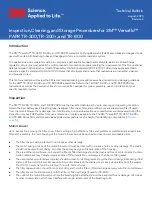
Technical Bulletin
August, 2020
Revision �
Inspection, Cleaning, and Storage Procedures for �M™ Versaflo™
PAPR TR-���, TR-����, and TR-���
Introduction
The 3M™ Versaflo™ TR-300, TR-300+, and TR-600 Powered Air Purifying Respirator (PAPR) assemblies are designed to be
used with certain 3M breathing tubes and headgear to form a complete respirator system.
Occupational use of respirators must be in compliance with applicable health and safety standards. By United States
regulation, employers must establish a written respirator protection program meeting the requirements of the Occupational
Safety and Health Administration (OSHA) Respiratory Protection standard 29 CFR 1910.134 and any applicable OSHA
substance specific standard. OSHA 1910.134 states that employers shall ensure that respirators are inspected, cleaned,
and properly stored.
This Technical Bulletin will review the 3M recommended cleaning procedures as well as inspection and storage guidelines
for the 3M™ TR-300, TR-300+, and TR-600 PAPR assemblies. Refer to the TR-300, TR-300+, and TR-600 PAPR
User
Instructions
as well as the
User
Instructions
for your specific headgear for proper assembly, use and limitations of your
specific respirator system.
Inspection
The 3M™ TR-300, TR-300+, and TR-600 PAPR must be inspected before each use to ensure good operating condition.
Detach the belt, battery pack, breathing tube, headgear, filter cover, filter, and prefilter or spark arrestor/prefilter (if used)
from the motor/blower. If any damage, non-functionality, or signal observations as noted below are discovered during the
inspection, remove PAPR system from use and service or replace as appropriate. The 3M™ Versaflo™ TR-300, TR-300+,
Motor/blower
NOTE
: Except for removing the filter cover, filter/cartridge, high efficiency filter, and prefilter or prefilter/spark arrestor and
filter latch assembly, the main housing of the motor/blower cannot be opened and has no user serviceable parts.
•
The filter cover must be intact with no cracks or other damage.
•
The main housing or case of the motor/blower unit must be intact with no cracks, holes, or other damage. The plastic
should not be discolored, chalky, or soft as these may be signs of deterioration of the housing.
•
The area of the motor/blower unit under the filter or filter/cartridge should be clean and free of contaminants. Contam
-
ination noted here may indicate improper/lack of filter installation or damage to the filter or filter gasket.
•
The user interface (motor blower display) should be clean. All LED segments should be lit and clearly visible during initial
start-up of the motor/blower. Excessive build-up of materials on the display may mask a visual alarm from the wearer.
The ON/OFF switch should be intact with no cuts, tears or holes.
•
The filter release button should function smoothly and hold the filter or filter/cartridge securely onto the motor/blower.
•
The filter cover should sit securely onto the filter or filter/cartridge (if used for TR-600).
•
The outlet of the motor/blower (i.e. where the breathing tube attaches) should be inspected for any damage, dirt, debris,
or other contamination which may interfere with proper attachment of the breathing tube.








